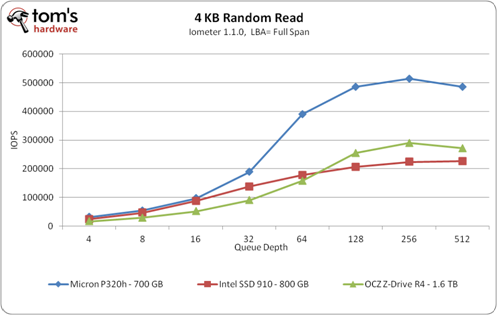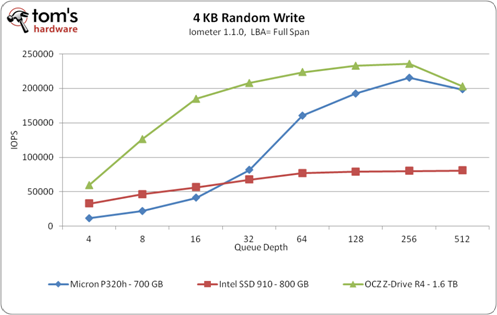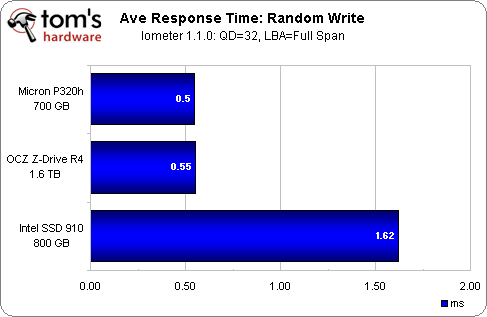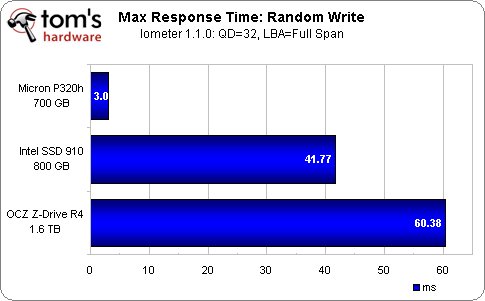Micron RealSSD P320h Review: A PCIe Drive Capable Of 3.2 GB/s
Announced earlier this year, Micron's RealSSD P320h PCI Express-based SSD promises to be an enterprise workhorse. A custom controller, single-level cell NAND, amazingly low latency, stellar random I/O, and incredible endurance combine to blow us away.
Get Tom's Hardware's best news and in-depth reviews, straight to your inbox.
You are now subscribed
Your newsletter sign-up was successful
4 KB Random Performance
Make no mistake about it, the RealSSD P320h is an absolute monster when it comes to random 4 KB reads. Topping out at over 500,000 IOPS, it easily beats the best from OZC and Intel. Micron did caution us that the P320h is optimized for large queue depths and likely wouldn't perform as well with fewer outstanding I/O requests (an admission applicable to any SSD, really). In our testing, we see that at queue depths of 16 and less, Intel's SSD 910 hangs right with the P320h, as its 32 channels simply go underutilized. At a queue depth of 32 and higher, though, Micron's P320h leaves its competition gasping for air. Presented with a workload truly able to push its unique architecture, the P320h rewards you greatly.
Random 4 KB writes, while still very impressive, don't impart as much shock value as read performance did. The RealSSD P320h can't keep up with OCZ's Z-Drive R4, though it easily dispatches Intel's SSD 910 at high queue depths. At low queue depths, the P320h doesn't perform as well. The Intel and OCZ offerings both establish a comfortable edge.
The P320h's average response time is excellent, beating the Z-Drive R4 by a hair.
Our maximum response time test shows the P320h flexing its muscles yet again. This is one of the clearest examples of the benefits afforded by bypassing the SATA/SAS interface entirely. Of course, arming the device with SLC NAND doesn't hurt, either. In fact, the P320h's maximum response time is only slightly higher than the SSD 910's average.
Get Tom's Hardware's best news and in-depth reviews, straight to your inbox.
Current page: 4 KB Random Performance
Prev Page Measuring Write Endurance: SLC Wins Again Next Page Enterprise Workload Performance-
mayankleoboy1 i dont see this as the future of consumer SSD's, just like a 16 core CPU is not the future of consumer CPU's.Reply -
bawchicawawa mayankleoboy1i dont see this as the future of consumer SSD's, just like a 16 core CPU is not the future of consumer CPU's.Reply
Such an apples to oranges comparison... -
memadmax Eliminating the SAS controller is the logical way to have these pci-e based ssd drives...Reply
Kinda surprised something like this didn't come out first as it makes more sense.... -
mayankleoboy1 bawchicawawaSuch an apples to oranges comparison...Reply
really ? Increasingly, performance is basically dependent on extracting parallelism. Whether in storage or in CPU performance.
Desktop/Mainstream users just dont do so much in parallel that they can fully use all the hardware. -
JOSHSKORN mayankleoboy1i dont see this as the future of consumer SSD's, just like a 16 core CPU is not the future of consumer CPU's.I see a purpose for 16 core processors. How are we going to otherwise be able to run Crysis 6?Reply -
mayankleoboy1 JOSHSKORNI see a purpose for 16 core processors. How are we going to otherwise be able to run Crysis 6?Reply
Use a 5000 core GPU ? -
youssef 2010 ArticleAlthough read performance is out of this world, the RealSSD P320h's write performance isn't nearly as spectacular. That's not to say the drive doesn't do well; it's just not as impressive after looking at those massive read numbers. read performance was out of this world, the write performance wasn't nearly as spectacular. Now, that's not to say that the P320h doesn't perform well, it's just not as impressive as the read resultsReply
????????!!!!!!!!!!! -
abbadon_34 After all these years it's nice to see the OCZ Revo at least mentioned. Considering a bootable PCI-E x4 SSD can be had for under $200 for over 5 years now, and is on it's 4th+ generation, one can only wonder why it's been ignored for so long.Reply -
Marcus52 Micron deserves a pat on the back for this one!Reply
Thanks for the review, love to see this kind of advancement and a peak into the future new hardware brings with it, even if it isn't directly applicable to me at this point in time.



